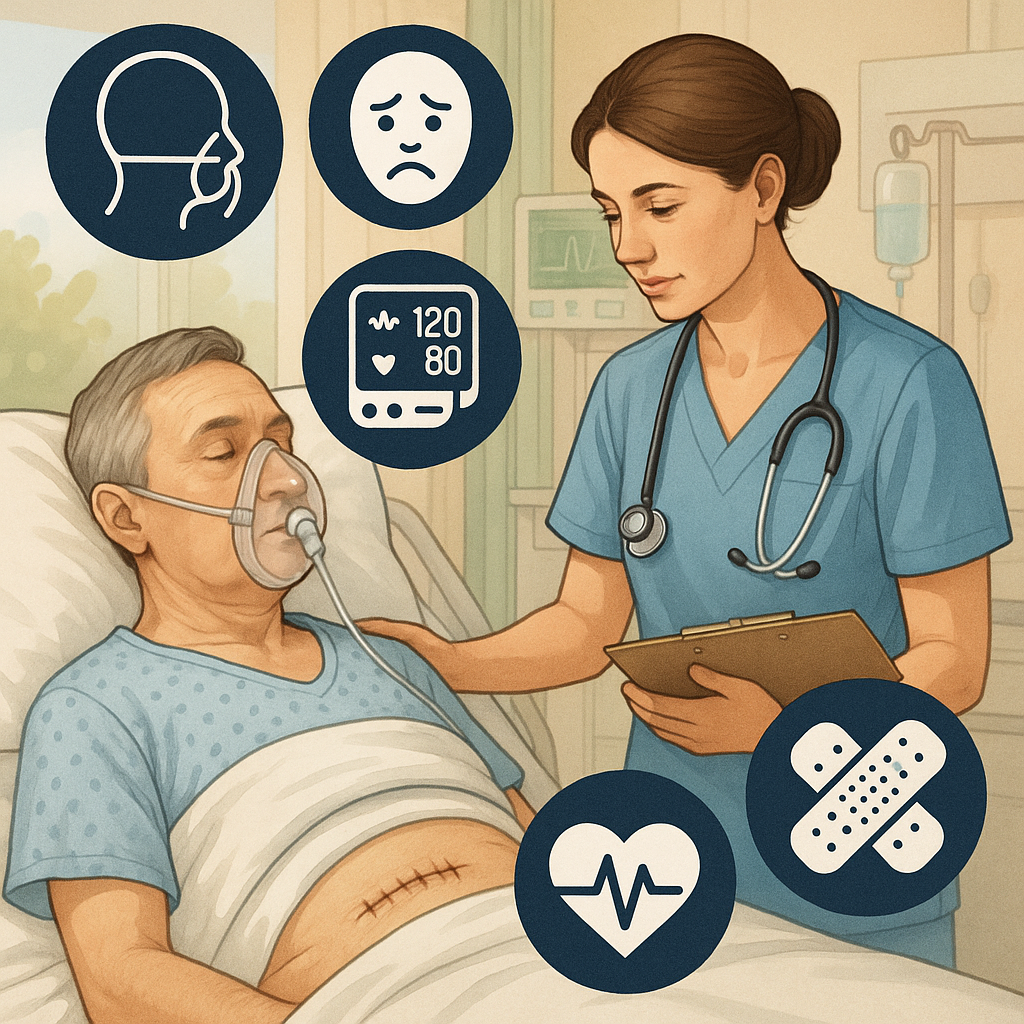Caring for patients after surgery is one of the most important roles for any nurse — especially for a registered nurse (RN nurse) preparing for the NCLEX. Post-op nursing care focuses on maintaining airway, breathing, and circulation (the ABCs), managing pain, and recognizing early complications. These skills are critical to safe, high-quality nursing practice and should be included in every nursing bundle you create for study or reference.
🩺 The ABCs: Your First Priority in Post-Op Care
A – Airway
- Ensure the airway is clear, especially after general anesthesia.
- Use oral airways or suctioning if needed.
- Monitor for tongue obstruction or laryngospasm.
B – Breathing
- Assess respiratory rate, depth, and effort.
- Check oxygen saturation.
- Watch for shallow breathing due to pain or sedatives.
- Provide supplemental oxygen if needed.
C – Circulation
- Check heart rate, blood pressure, and capillary refill.
- Monitor for bleeding or shock.
- Inspect surgical dressings for excessive bleeding.
NCLEX tip: Always address airway FIRST, then breathing, then circulation!
🩹 Pain Management After Surgery
Pain is a top concern for patients in the post-op setting.
Key strategies:
✅ Assess pain frequently using a standardized pain scale
✅ Advocate for the patient — do not ignore pain complaints
✅ Administer prescribed analgesics, but also consider nonpharmacologic measures like repositioning or relaxation techniques
✅ Monitor for opioid side effects such as respiratory depression
✅ Teach patients about realistic pain control goals
Registered nurse role: Document the pain assessment, interventions, and the patient’s response carefully, as this is a key NCLEX priority.
⚠️ Post-Op Complications to Watch For
Every nurse should be vigilant for complications that can arise after surgery.
1️⃣ Respiratory Complications
- Atelectasis (collapsed alveoli)
- Pneumonia
- Hypoxia
✅ Encourage deep breathing and coughing
✅ Use incentive spirometry
2️⃣ Cardiovascular Complications
- Hypotension
- Hypertension
- Dysrhythmias
- DVT/PE
✅ Early ambulation
✅ Sequential compression devices
3️⃣ Infection
- Watch surgical sites for redness, swelling, warmth, or drainage
✅ Perform sterile dressing changes
✅ Teach good hand hygiene
4️⃣ Bleeding & Hemorrhage
- Monitor surgical drains
✅ Watch vital signs for changes
✅ Report excessive bleeding promptly
5️⃣ Urinary Retention
- Due to anesthesia or opioids
✅ Encourage early voiding
✅ Perform bladder scans if needed
6️⃣ Gastrointestinal Complications
- Constipation or ileus
✅ Promote movement
✅ Advance diet as tolerated
🧩 NCLEX Post-Op Cheat Sheet
Add these essentials to your nursing bundle:
✅ Post-op ABC checklist
✅ Pain assessment chart
✅ Complication recognition cheat sheet
✅ Early mobility and incentive spirometry reminders
These tools will help you feel confident as an RN nurse and succeed on the NCLEX.
📚 Patient Education Tips
✅ Report pain early
✅ Understand how to use a pain scale
✅ Practice deep breathing and coughing
✅ Know when to call for help (fever, bleeding, worsening pain)
✅ Follow discharge instructions carefully
Educating your patients will reduce complications and promote healing.
📝 Quick Memory Tips for Nurses
💡 Airway first — always remember ABCs
💡 Pain is what the patient says it is — believe them
💡 Early movement = fewer complications
💡 Monitor surgical wounds closely
These points are high-yield for your NCLEX studies.

